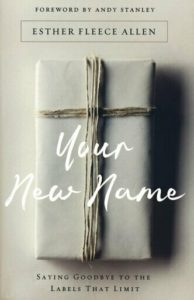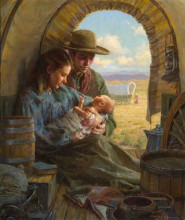
The War of Words
In this Adventures in Odyssey drama, a carelessly uttered word from Eugene creates havoc as it becomes the fashionable insult, resulting in a lesson about the power of words.
Home » Episodes » Focus on the Family Broadcast » Rising Above the Labels That Bind You
Excerpt:
Mrs. Esther Fleece Allen: And most of us are going to find ourself in a very difficult situation. And what I want to say to you is that God is not going to define you out of that circumstance, but God has a new name and when you hear your new name, it’s going to help you move forward.
End of Excerpt
John Fuller: That’s Esther Fleece Allen, and you’ll be hearing more from her today on Focus on the Family about putting off the old labels that bind you and limit you and instead discovering your new name in Christ. Welcome to the broadcast. Your host is Focus president and author, Jim Daly. And I’m John Fuller.
Jim Daly: Uh, John, each of us can struggle from time to time to know who we are, what we’re about. Um, I’m working on that with my teen boys, you know, their identity in Christ. And it’s great for parents to, you know, be diligent about talking, especially to your teenagers about their identity in Christ, who they are, because it’s – you know, the culture is just pulling at them constantly trying to create their own identity from a cultural standpoint. So, it’s – to me, it’s one of the core things I’m doing in my parenting right now. Um, today, we’re going to talk about something very interesting, maybe some things that you’ve never thought about, why God changes names, for example, in Scripture. Why did Saul become Paul? And, you know, it’s good to slow down and think of who we are in Christ. What’s our identity? What’s our new name?
John: Yeah. And, as I said, Esther Fleece Allen has joined us. She’s a writer, speaker and founder and CEO of L & L Consulting, which helps develop strategies for nonprofit organizations. She was formerly on staff here at Focus. And it’s fun to have her back to talk about her book, Your New Name: Saying Goodbye to the Labels that Limit.
Jim: Esther, great to have you back.
Esther: It’s great to be back. Thank you for having me.
Jim: Yeah, how fun, huh?
Esther: It is fun.
Jim: Now, you left – what year did you leave Focus?
Esther: I think it would have been 2012, the end of 2012.
Jim: Okay. For the listeners, just think about this. Esther, you know, is still this vibrant person, but you were single then and you were doing a kind of millennial outreach and all this kind of…
Esther: Yes.
Jim: …New cutting stuff for Focus. And what’s happened over the last couple of years?
Esther: And I was here really on and off for 10 years.
Jim: Yeah.
Esther: I spent time even studying here when I was in college. Um, but it’s crazy. I left Focus on the Family and that’s when I met my husband. Go figure.
Jim: (Laughter).
Esther: So, since then, um…
Jim: Well, that’s what I was driving to.
Esther: (Laughter).
Jim: Not only that, but now you have two children.
Esther: I have two beautiful boys and…
Jim: 2 and 4-months-old, right?
Esther: Yes, 2 and 4-months. So…
Jim: That is great.
Esther: …We’re not getting a lot of sleep, but there’s a whole lot of love in our home.
(LAUGHTER)
Jim: Well, if you get incoherent, we’ll, uh, let you know.
Esther: (Laughter) Thank you.
Jim: But – this is really interesting. Uh, I want to start with the difficult journey you’ve been on. I mean, most people aren’t going to remember when we talked about that many years ago on the broadcast. But let’s go to the answer. What does it mean to have a new name and why is it important?
Esther: Yeah.
Jim: Then we’re going to fill in a lot of the backstory.
Esther: Sure. You know, I think that this word “new” – we’re are familiar with the word “new” as Christians in Scripture. We know about the New Testament, the New Covenant. Um, God makes us a new creation, but very few of us are talking about the new name that He gives us. And I believe that every Christian will get a new name. In Scripture we see in the Old Testament many times God would give a physical name change to somebody and we see that also in the New Testament. But even if there isn’t a physical name change – like how I’ve gone from Esther Fleece to Esther Allen – even if there isn’t a physical name change, there will be a spiritual change. There is an old and a new.
Jim: Right.
Esther: And this word new defined in Scripture is “not found exactly like you were before.” And so, every single one of us who is in Christ, we have a testimony of newness. We have a new name that God wants to put on display, not our old brokenness.
Jim: Yeah and that is so good. And I – again, I think for the listeners to be able to better connect with your story, let’s start there. Let’s go back to your childhood – very broken home. Describe it for us.
Esther: Sure, you know, my father had a mental illness and, um, would act out, uh, very inconsistently. He was violent towards my mother. Um, my mother years later ended up getting remarried. That stepfather left after an affair that he had. And then I found myself as a teenage girl, really orphaned. My mother left me at that time. So, there was – there was a lot of brokenness. I think every single one of us comes from a broken family in the sense that every family after the fall is a broken family.
Jim: Right.
Esther: So, every single one of us, even if we have been raised with good, godly parents, there’s going to be parts of our story and about our identity that we might have to wrestle with. And Scripture gives us this permission to wrestle with God. And so, there were things I had to wrestle with. I was orphaned, I was unwanted, I was unloved. And those labels carried with me even into my 20s, even into my 30s. And I just thought maybe they’re always going to be with me.
Jim: Yeah.
Esther: Maybe I will always be the overcomer, but I was the orphan girl. You know, I’m the overcomer, I’m the achiever, but I was unwanted. You know, when I was studying the new names in Scripture, I realized that the enemy wants us to stay stuck in old labels, but that God names us for our future. God wants to move us forward. And so, while those things might have happened to us, people might have mislabeled us, we – maybe have mislabeled ourself by our circumstances, that isn’t the new name that God has for us, and that isn’t what God wants us to walk out of…
Jim: Right.
Esther: …And into.
Jim: You – and this is very tender. Again, as a teenager, uh, it was falling in on you. I mean, these feelings of abandonment. And, again, I can so relate to that. But you did find yourself depressed and speak to that dark time in your life when you even contemplated suicide.
Esther: Yeah. You know, I – I mean, I think a lot of young people when their family leaves or dies or they go through a tragedy – unfortunately, one of the world’s coping mechanisms is “Well, this is just too difficult and if you end things, your pain will end.” And it’s a big lie that the enemy, um, says to people, and not just teenagers, you know, it’s – it’s everyone. And, um, so, what was interesting is that, uh, two decades after my father had left – I was actually working for Focus at the time – my biological father began stalking me, and I was devastated. I thought I had just overcome this hard story and that, that was part of my past that was supposed to stay in the past. And I didn’t know how to deal with it here in the now. You know, here I am, a 20-something, a young adult thriving in my career. I love my work. I love my friends. I’m serving my church. And I didn’t know what to do when my abuser came back.
Jim: Hmm.
Esther: And I just have to share that suicidal thoughts did come back. And it wasn’t that I wanted to die, it was that I wanted my pain to end.
Jim: Well, that’s true for so many teenagers and 20-somethings.
Esther: It is. And then, Jim, I have to share that I went through very difficult years of stalking. I was so emotionally and spiritually drained, I stepped away from work for years because I needed to prioritize emotional health and spiritual health.
Jim: Sure. I mean, it was pressing in.
Esther: It was – it was devastating. Um, I got married. The Lord was bringing new seasons to me, and my father died on our honeymoon. So, I was experiencing this love of all loves. I had never felt the love like I had experienced through my husband. It was life changing. It was transformative. It is still one of the greatest gifts that God has given me is marriage. But then to experience my father’s death on our honeymoon, how was I supposed to deal with that?
Jim: Oh, yeah.
Esther: I went to the Scriptures, and I see again and again where people say, “Save me, God. Save me, God. Save me, God.” I thought a save me prayer was just a one and done prayer. I thought, we’re supposed to pray to be saved and then once we’re saved, we’re God’s children and then we’re just supposed to pick ourselves up and move forward.
Jim: Then it’s just sanctification, as we say.
Esther: Exactly. I thought, okay, we’re just supposed to now be – live righteously and be sanctified by God and the Holy Spirit works in us. What I was missing is the prayers that are woven throughout Scripture from David, from God’s mighty people, from women who have experienced infertility. They’re saying, “God, save me. God, rescue me. God, help me.” And I realized that in my moment of distress, in my moment of despair, I didn’t need to remain myself; I didn’t need to choose to end things; I didn’t have to take things into my own hands, I needed to again say, “God, save me. God, I need You, and don’t let me stay stuck in this circumstance, because this circumstance is more difficult than I can handle.”
Jim: The, um, difficulty, again, no matter what age you are when you’re facing that kind of valley in your life – and people listening are facing something, right? Most people, many people, especially given the environment we’re in. It may be unemployment. It could be, you know, a wayward teenager, whatever it might be. And this is the toughest question that I get asked. And that is, you know, in that context, when you were a teen, when you were a 20-something trying to get oxygen – right? – even as a believer, just trying to breathe, because all this was crashing in on you – even in your happiest week, your honeymoon that you – I know you looked forward to that time, even though you didn’t even know who that man would be. But there that problem, that major cloud, came over you again on your honeymoon. That’s terrible. But the right question is how to God begin to show you His love…?
Esther: Yeah.
Jim: …Through other people? Especially outside your family, obviously, that…
Esther: Yes.
Jim: …You weren’t getting it from your family.
Esther: You know, it’s amazing, Jim, is that God never renames us out of our sin. God never renames us out of our shame, out of our most embarrassing moments, out of our failures. The way that God names us is out of His love for us. And so, it is profound and deep love that God has for His children and those who are not even yet His children, that He wants to have them become His children, that He gives us a new name. And so, that’s again, where I had to say to God, “Who am I to You? And is this the end of my story?” And it wasn’t. And that’s what I want to say to the listener, is that if you are facing difficulty in your marriage, if you have lost your job, if you are struggling in your relationship with your teenagers, it – this is not the end of your story. This might be a very painful season. This might be part of walking through the valley of the shadow of death. But there is a walking through that needs to take place. There will be another side. Pastor Louie Giglio says that, “If it is not good yet, God is not done.” And that’s what I would say to the listeners. I needed that hope from other people that, “Esther, this is difficult. Esther, this is challenging. This is hard. I’m sorry that you’re having to live through this grief again, but this is not the end of your story.” And that’s the hope that our new names give us.
Jim: Hmm.
John: Hmm. This is Focus on the Family with Jim Daly. And our guest is Esther Fleece Allen. We’re talking about her book, Your New Name: Saying Goodbye to the Labels that Limit. And we have copies of that at focusonthefamily.com/broadcast.
Jim: Let’s go to a – a real cultural one. You have a wonderful story about a woman who experienced an abortion as a teenager. That’s going to apply to millions of people. We know that almost 60 million abortions have occurred, maybe over that number now. So, that – that’s affecting a lot of people. What was that story? What was she hearing as a teenager, a 20-something and how did she fight through that?
Esther: Yeah. You know, there are so many women who have a testimony of, um, having an abortion and then coming to Christ realizing what they did was wrong and repenting. And I’m so grateful that there is such a grief that a woman has to go through if she’s made that decision. Um, and that should be celebrated, if she realizes she’s forgiven, and she accepts Christ because Christ went to the cross to forgive her. But I want to say that there is a there is a step, too, and that’s she needs a new name. You know, this woman came up to me after speaking and said, “I believe my name is ‘murderer.’ Like, I took the life of my child. I realized what I did. And I live out of this every day that this is my name. My name is ‘murderer.’” And I said, “Are you a Christian?” And she said, “Yes.” And I said, “Have you asked God for forgiveness?” And she said, “Yes.” And I said, “Then He has a new name for you. Let’s ask Him. Let’s ask God how He sees you.” And in that moment, we prayed, and she lifted her head up and she said, “I’m clean.” He says, “I’m clean.” And she wept, and she wept. And she – she actually has kids at home, and she said she was parenting out of a place of anger, because she had such guilt for this decision that she had made 20 years ago. Instead God had a new name for her. And we know that God would have a name for that precious child, as well. And so, I think that’s where the freedom comes, is we don’t have to continue to live out of the label or out of our old story if we were unwanted or unloved, that doesn’t have to define us moving forward, that there is a part two for all of us, that we don’t stay stuck in the sin that we’ve committed or the sin that’s been done to us. There is a new name and a new birth that God wants to do in our lives.
Jim: And the question is, for those listening, obviously, is the process. It’s hard. It’s like you hit the wall and bounce back, so you keep hearing the same label, and you don’t accept what God is feeling towards you – His love, endless love, for you. Um, how do you break through the wall?
Esther: Yeah.
Jim: I mean – what was your own experience that way?
Esther: This is a constant process and I think every single one of us is gonna go through a different – we’re gonna have a different story, because God’s creative and He’s so personal, so He knows how to speak directly to us and how we need to be reminded again and again. I think I go back to the story of Jacob being renamed to Israel in the Scriptures. You know, Jacob’s name, there’s some debate about this, but one of the meanings could be “deceiver.” And Jacob kind of lived in that way. Um, as he was wrestling with God – he was wrestling overnight. Many of us have – have done that. We’ve had a dark night in the soul. We’ve wrestled with God through the night. God renames Jacob to Israel. So, it’s not when Jacob then repents. It’s not when Jacob just fully turns his life around. It’s not when Jacob starts listening to Christian music. It’s in the middle of the wrestling God says, “I’m naming you Israel, because I have a future for you and there’s a meaning behind that.” And so, I think that’s where we need to have a little bit of space in the body of Christ is that we’re gonna have different wrestling stories. For me, it was over years that I needed Christian families to show me the love of God. And they were so faithful to hang in there with me and to believe that God was not done in my story. Every single one of us will have a story of overcoming. Scripture rarely talks about suffering without also addressing how God wants us to be overcomers.
Jim: Yeah. Esther, you have a little bit in the book there that talks about earning the label, earning the name. I think it’s important that we talk about that. Um, people can strive. Um, what is a healthy way of trying to please God so that it’s not an if/then? “If I do this Lord, then You will bless me. Then You will call me by something good.”
Esther: Yeah. Yeah.
Jim: So, speak to that issue.
Esther: Most of us want an A+B=C Christianity. You know, even as I was studying this concept for the book, you know, I wanted what the formula should be because I wanted to be a good Christian and do it. Um, but that’s just where the relationship with God steps into play. And I think, again, many of us, as we’ve been walking with Christ for years, we get into this, um, flow that we think our actions earn His favor. But the way that God renames people, and the way that God names them, again, is sometimes right in the middle of their wrestle, is sometimes right in the middle of their struggle. And so, we don’t have to just tidy up our lives to go to God. God wants to meet us. God pursues us. And God has new names for us in whatever season we’re in. And those names are going to help us move forward. You know, the Book of Psalms, it says in Psalm 40:3, that God puts “a new song in our heart, a hymn of praise.” And that’s a way that people can see your testimony when they see this new song that was birthed in you. But if we skip over that the – the mire came before that, the muck, the destruction, the devastation, that was first. And most of us are going to find ourself in a very difficult situation. And what I want to say to you is that God is not going to define you out of that circumstance, but God has a new name, and when you hear your new name, it’s going to help you move forward.
Jim: Esther, um, we’re coming into the end here, but I do want to, uh, talk about you meeting Joel, your husband, because I’m sure that had both difficulty as well as blessing. And if you can, speak to that issue. I mean, we left people hanging there with your honeymoon and what happened with your father. And how did you and Joel, um, in that context of marriage – how has that been strengthening for you?
Esther: Hmm. Well, it’s interesting that God would give me a physical name change (laughter) um, in the midst of studying a spiritual name change. And, you know, in this season of stepping away from work, I thought it would maybe be a couple weeks that ended up being a couple years. Um, and I decided to take a season to study at Oxford University because, you know, I connect with the Lord through feeling. I’m a feeler, and I just wasn’t feeling Him for years. I just – I was actually feeling like an abandoned daughter again. And before I went over to Oxford, um, just in my own time with God, I felt like He was saying, “Esther, you are a bride.” And I didn’t, like, understand why He was speaking that to me. But it was important that I listen and hear, “You are a bride. You are My bride.” And I felt the Lord say, “You are going to be a good bride because you already are a good bride.” And that’s what was life changing for me. Maybe I can be a good bride here, physically, because I cared to be a good bride to Christ. And that’s what happens when we have this spiritual name change with God. We believe it differently, and we can apply it in the physical. And so, I went over to Oxford University, and my spiritual dad, Jason Elam, who was also there studying, was in class with this man named Joel Allen. And Jason knew me enough to not – not say it was a setup.
(LAUGHTER)
John: But it was a set-up, wasn’t it?
Esther: But it was a set-up.
Jim: That I would have been the death blow of the relationship.
John: Yeah.
Esther: And sure enough, I was at, uh, dinner with the Elums who are family to me. And this man, Joel Allen came up, and, uh, my life was changed. And, you know, he began pursuing me in a beautiful way. He asked Jason for permission. As we got to know each other, he asked permission to date me, um, which meant a ton, because I was going through this turmoil with my biological family. And he pursued my heart beautifully. Um, but I did the hard work with God before he came. I think a lot of us, we think circumstances are what’s going to change our story, but God invites us to transforming work with Him…
Jim: Yeah.
Esther: …And with the body of Christ. And so, I want to say I did the hard work in counseling. I did the hard work with these Christian families who took me in and re-parenting me. And I just hung in there with God and I believed – I believed Him when He said, “I’m a good bride.” And it allowed me the opportunity to be pursued to then become a physical bride.
Jim: Yeah, and I’m sure Joel played a fantastic role in that whole process…
Esther: He still does.
Jim: …Being patient.
Esther: You know, he still has to – he still reminds me of who I am. He still reminds me.
Jim: Yeah.
Esther: Could you imagine if we just got married, and on our wedding day he said, “I love you” and he never said it again? You know, some of us think we’re just supposed to get through this Christian life without hearing God say, “I love you,” but we need to hear it again and again that He loves.
Jim: Yeah. Esther, fear can often grip people, obviously, even people that are moving generally in the right direction. I mean, we might call it a speed bump, a wall – however you want to describe it – but oftentimes that can be wrapped around fear. That was the fear of becoming a mom, too.
Esther: Yes.
Jim: We need to move into that briefly, but, I mean, you’re married. That’s great. That step. You are trusting God for that. And then, okay, now, what about children?
Esther: Yeah.
Jim: I’m in my 30s. What are we going to do?
Esther: And I believed that children were a blessing. I mean, I worked at Focus on the Family. We were – we memorized that here.
(LAUGHTER)
Esther: And I love children and I’d always had children around me. But I just – I think I was so afraid of continuing a cycle of brokenness. I was just so afraid. What if I end up doing to my kids what was done to me? Or, you know, I – I just was paralyzed in many areas of fear. And there was a morning that I heard my husband. Um, he was having his morning coffee time. He loves coffee, and he loves just having quiet time in the morning. He was in the other room. And, um, he started praying for our family and that God would bless us with children and he was praying for me. And I realized, wow, I am the person to answer that prayer. (emotion) And, you know, in Scripture, we see Abram and Sarah, and we see that Sarah took that into her own hands and I didn’t want to take my story into my own hands anymore. I didn’t want to write my own script. And I realized, wow, I am the woman that God has chose to answer my husband’s prayers. And, um, it was shortly after that we found out we were pregnant. And thank God you have like 9, 10 months to get ready. (laughter).
Jim: Right.
Esther: And it was a precious time with realizing that one of the new names God wanted to give me is the name “Mom.” And I love being a mom. It is not my sole identity, but it is one of the greatest gifts that God has given me. And it’s one of the greatest names that God has given me. And healing and forgiveness, even towards my biological family, surprisingly, have come through my children. And so, it’s – God wants to give us new seasons, gifts of maybe marriage, gifts of maybe children, maybe He has different career path for us as we walk out and faith, um, but sometimes it requires a lament first and realizing what is the fear? What is the label that’s holding me back, and how might God want to move me forward?
John: Yeah. And, Esther, just a moment ago you mentioned forgiveness. Um, how do you forgive someone who has hurt you so deeply like your dad did? I mean, for those listening if might be another relative or friend, but how do you forgive?
Esther: Yeah. I read every single book there was of how to forgive, and I never was able to fully forgive. And, I mean, I listened to every sermon possible, and it just never came. And I thought, there’s something wrong with me that I’m not able to forgive fully. Um, but the reality is, I was minimizing my pain to a three. I was saying, “Well, it wasn’t that bad. You know, it could have been worse.” And – and we all have our own unhealthy coping mechanisms. But when I was minimizing my pain to a three, I was forgiving at a three. And so, it wasn’t until I really lamented, “God, this stinks. This is so hard! How come he is dying on my honeymoon? Like, how did You let this happen? How am I supposed to handle this? Like, who’s gonna handle his funeral?” All these questions, all these laments. When that grief came out, it was an opportunity for me to fully forgive and to heal. And, Jim, as I was on that process, it was not an overnight thing. Forgiveness did not happen overnight. To some people it will, and I bless you for that, but for me, it was a continual year after year process of choosing to forgive my offenders, choosing to forgive my biological father, choosing to forgive my mother. And it was when my first son was born, and I was changing his diaper – he was two-months-old – I started singing the Apostles Creed over him and I was, like, not even sure where I knew the song from.
Jim: (Laughter).
Esther: And I sat down, and I was so grateful to be the mother of this beautiful boy. And I realized that my biological father had taught me that creed. (emotion) And I was able to forgive him.
Jim: Hmm. Right there. Powerful.
Esther: And all those labels that my father did deserve – he was absent, he was abusive, he hurt me – all those labels that he deserved, I was able to rename him and I was able to say he tried. He did love me. He was sick, and he wasn’t well. But I don’t have to believe him to be that monster anymore. I can say that I’m grateful that he taught me the Apostles Creed and that I can teach it to my son now. And so, the healing doesn’t come overnight. Our new names don’t come overnight, but it’s so worth it when they do come and there is a load that’s lifted when we’re able to rename our offenders.
Jim: Wow. That is so well said.
John: Yeah.
Jim: Um, I’m impressed. I mean, you have done a lot of growing…
Esther: Mm.
Jim: …And the Lord is working in your life in such a marvelous way. Folks, you’ve heard it. I’ll tell you what, I want to get this into your hands ’cause there’s so much content we didn’t get to and there’s so much more that Esther is sharing in her great book, Your New Name. And if you can make a gift of any amount, we’ll send it as our way of saying thank you. If you can’t afford it, we’ll get it into your hands. Just call us. Let us pray with you and, uh, we’ll trust others will take care of the costs of that. It’s one of those tools that you need in your toolbox to draw you closer to God.
John: And, uh, we’re going to encourage you to give us a call and ask for that book. Our number is 800, the letter A and the word FAMILY. And our website is focusonthefamily.com/broadcast. And, uh, while you’re there online be sure to look for our little, online booklet called Coming Home. That will introduce you to what it means to follow Jesus, to know Him, to be, uh, freed from a life of sin and to be able to enter into a relationship with God. And, uh, along the way here we’ve talked about a number of pretty sensitive topics and if you’re in a place of brokenness and you’re hurting, give us a call. We’ll walk through some of the steps of following Christ and, uh, we’ll pray with you. If you’d like, we can even schedule an appointment with one of our caring, Christian counselors. Our number again is 800, the letter A and the word FAMILY. Well, join us next time as, uh we take a lighter look at life with comedian Tim Hawkins.
Teaser:
Mr. Tim Hawkins: The last year for Christmas I got the laziest gift from my kids. They got me an alarm clock that projects the time onto ceiling.
Audience: (Laughter).
Tim: ‘Cause y’all know how hard it is to go…
Audience: (Laughter).
Tim: No, no. This has gotta stop right here. This is way – I need a Red Bull. This is taking it all out of me.
Audience: (Laughter).

Esther Fleece Allen is a widely recognized expert on the Millennial Generation, with her insights into the experiences and aspirations of millennials appearing in major media outlets like The Washington Post and CNN. She also served as a director of millennial relations for Focus on the Family. Esther is a popular public speaker, a professional consultant, and the author of two books titled No More Faking Fine and Your New Name. She and her husband, Joel, have two children. Learn more about Esther by visiting her website, EstherFleeceAllen.com.

Receive Esther Fleece Allen's book Your New Name for your donation of any amount!

Receive "A Prayer for New Life" print by Morgan Weistling with your donation of $150 or more.

Visit our online store and purchase a CD of today's program for yourself or to share with a friend.

Focus on the Family offers a one-time complimentary consultation from a Christian perspective.

There's no place like home, right? Just as home brings a sense of belonging, rest, and security, so does a personal relationship with Jesus Christ. If you don't have one, this booklet can show you how to find your place in God's eternal family.

Children who have been in foster care, like Susie were wounded most in the context of interpersonal relationships, and they will heal only in the context of healthy, nurturing, interpersonal relationships.

After nearly 20 years of marriage, Ian has identified three focal points that help him maintain a steadfast marriage despite a background of childhood trauma.

Teach your kids that Jesus did for us what we could never do for ourselves: He measured up. He satisfied all that God asks of you or anyone to be in relationship with Him.

Rosaria Champagne Butterfield shares her dramatic testimony of coming to faith in Jesus Christ after living as a lesbian who was vehemently opposed to Christianity and the Bible. (Part 1 of 2)

God forgives you just because He loves you. But He didn't have to forgive; He chose to forgive, compelled by an innate, deep and abiding love.

Remember that you are not alone; your ache is common to every human on earth.

In this Adventures in Odyssey drama, a carelessly uttered word from Eugene creates havoc as it becomes the fashionable insult, resulting in a lesson about the power of words.

This discussion offers a preview of Volume #16 “Cultures in Conflict” from the That The World May Know video series, available below.

Debra Fileta will help couples better understand the four seasons of healthy relationships, what to expect during each one, and how to carefully navigate them for a stronger marriage. (Part 1 of 2)

Larnelle Harris shares stories about how God redeemed the dysfunctional past of his parents, the many African-American teachers who sacrificed their time and energy to give young men like himself a better future, and how his faithfulness to godly principles gave him greater opportunities and career success than anything else.

Amy Carroll shares how her perfectionism led to her being discontent in her marriage for over a decade, how she learned to find value in who Christ is, not in what she does, and practical ways everyone can accept the messiness of marriage and of life.

Jonathan McKee offers parents practical advice and encouragement in a discussion based on his book If I Had a Parenting Do Over: 7 Vital Changes I’d Make.